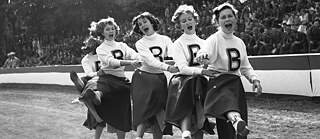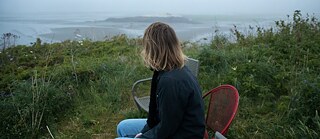Übergangslösungen auf Dauer
Little America Revisited
Seit dem Zweiten Weltkrieg waren und sind unzählige US-Amerikaner*innen in Deutschland stationiert – in Militärbasen, die teils einem ‚Little America‘ gleichen. Monika Müller-Kroll und Sylvia Cunningham unterhalten sich mit ehemaligen Soldat*innen, die in Deutschland geblieben sind.
Diese Folge anhören: Apple Music | Spotify | Download
Diese Folge stammt von den Berliner Radioproduzentinnen Sylvia Cunningham und Monika Müller-Kroll. Monika arbeitete früher als Reporterin für NPR Berlin, Sylvia für „NBC Nightly News“ in New York, bevor sie 2017 nach Deutschland zog, wo sie seitdem beim Radio arbeitet. Monika hat bereits in Städten überall auf der Welt gelebt, wie Amsterdam und Los Angeles, wo sie Radiobeiträge für verschiedene deutsche Radiosender produzierte. Sie ist aktuell als Editorin und Radioproduzentin in Berlin tätig. Bei KCRW Berlin gestalteten Sylvia und Monika das englischsprachige Programm für Zuhörer*innen aus der deutschen Hauptstadt. In „Little America Revisited“ kommen ehemalige Angehörige des US-Militärs zu Wort, die in Deutschland stationiert waren und noch immer dort leben. Auch der Entertainer Ron Williams reflektiert seine frühen Jahre in Deutschland. Die Musik und die Tonclips wurden von EB Davis, Ron Williams und Jonathan Kroll komponiert. Das Foto zeigt amerikanische Cheerleaderinnen in einem U.S.-Militärstützpunkt in Deutschland und stammt aus Dr. John Provans Sammlung des Alliiertenmuseums in Berlin. Außer der Folge „Little America Revisited“ haben Sylvia Cunningham und Monika Müller-Kroll die Episode „I Love You, I Hate You“ aufgenommen, Monika produzierte mit Dina Elsayed zudem „The Diary“. Die Podcasts „Das Tagebuch – The Diary“ und „Little America“ stehen auch in deutscher Sprache zur Verfügung. Gemeinsam mit Nikki Motson produzierten Syvia und Monika darüber hinaus die Folgen „Legacies of the Berlin Wall“, „Luftbrücke – 70 Years of Memories“ und „The Berlin Ringbahn“.
Transkript
[“I STILL NEED SOMEONE” FROM EBSOLUTELY STARTS]
EB Davis: Initially I didn’t want to come to Berlin because I knew it was behind the Iron Curtain, as they called it.
Felicia Peters: I did have a choice whether to come here or to go to Japan. And I said I wanted to come to Germany, I don’t even really know why.
Rick Pomerance: It was going to be my big adventure, I was getting out of Miami. Since the ninth grade I was taking German in school, so I was ready to use it.
Ron Williams: I wasn’t the normal run of the day GI, put it that way.
Sylvia Cunningham: Ron Williams, Rick Pomerance, Felicia Peters, EB Davis ... they are just four of the hundreds of thousands of American GIs who were deployed to Germany during the Cold War.
Monika Müller-Kroll: They were stationed across West Germany, arriving over the span of about three decades.
John Provan: We had everything that you could dream of over here. But it was never in the big picture. It was always just for the Americans.
Sylvia Cunningham: This is John Provan, a historian and the son of an Air Force Chief Master Sergeant. He may sound American but John has spent practically his entire life away from the United States.
John Provan: My knowledge, my experience and my background of the United States is strictly that what I experienced in ‘Little America.’
Monika Müller-Kroll: In this episode of THE BIG PONDER, we talk with Americans who came across the Atlantic with the military but decided to stay and make Germany their home.
Sylvia Cunningham: We’ll give you snapshots of these GIs lives, then and now. We’ll talk with an entertainer, a musician-turned-caretaker, the owner of Germany’s first car pawn shop, and a ‘Blues Ambassador,’ whose music we hear now. I’m Sylvia Cunningham.
Monika Müller-Kroll: And I’m Monika Müller-Kroll.
[MUSIC FADES]
Monika Müller-Kroll: By the time our interviewees arrived in Europe, Germany was a divided country. And during the Cold War, U.S. troops were stationed in more than 200 military installations in western Germany. After the fall of the Berlin Wall in 1989 and German reunification the following year, installations gradually closed down. The number of troops shrank. These days, there are fewer than 36,000 active soldiers stationed in Germany. But at the height of the Cold War there were hundreds of thousands of GIs with their families living here — and they could essentially live like they did back in the States, in communities called ‘Little Americas.’
Sylvia Cunningham: The historian John Provan, who calls himself an ‘Air Force brat’ spent pretty much his entire childhood in Little America. This is how he describes it:
John Provan: Basically everything that you could want to do, be it bowling, movie theaters, wood shops, car shops, repairs, you name it. It was all on the installation so you never had to really leave your housing area or whatever to see the local German community.
Sylvia Cunningham: Everything they needed was available in English — films, books, newspapers. In fact the only reason John had to leave the base to go downtown was when he couldn’t get what he needed at the PX or post exchange.
John Provan: The PX is where you buy your clothing — all the products that you need. Shoes, picnic stuff, everything you would normally find, say in a Walmart. And the commissary was the facility where ... that was strictly food. That is, any product, meat, potatoes, fruits, vegetables, you name it. That was all available in our commissary, with the unique aspect that it was all American products. All in ounces. All with legible, you know, descriptions in English as to where it came from. And in fact our bread — that is, you know, the American loaf of bread that we like to smunch up — that was produced in a bakery that was run by GIs for the military in Grünstadt. And excuse me, this single bakery produced all the hamburger buns, the hot dog buns, bread, ice cream cakes, cookies. They had almost 1,000 people working there. It was a huge, huge bakery. And they supplied all the GIs in all of Europe!
Sylvia Cunningham: These military installations were designed to make Americans feel at home. They were sort of like bubbles. Both independent from the surrounding German community and removed from many of the day-to-day worries facing Americans back at home.
John Provan: We only had the positive side. I mean, what could go wrong in the bubble? You didn’t have poverty because everybody was employed by the military. Everybody could make do. You had housing. Base housing was free. You could use all the water and electricity you wanted because it was all paid for by the military, so a lot of the little problems that you had ... that you would have had as a civilian, you know, you didn’t have with the military.
Sylvia Cunningham: But not all GIs lived in these bubbles, these Little Americas. By choice or depending on their assignment.
EB Davis: The full name is Ebylee but everybody know me as EB.
Sylvia Cunningham: EB came to Berlin in the early 1980s. He was part of a highly secretive unit called the U.S. Military Liaison Mission.
EB Davis: We were a small unit, and we had our own places to live. Put it like that.
Sylvia Cunningham: But not living on a base wasn’t the only unusual aspect of EB’s experience as a GI in Germany. There was also this:
[“UH, UH BABY” FROM EB DAVIS & THE SUPERBAND — LIVE AT THE A-TRANE BERLIN STARTS]
EB Davis: By day we were doing our military assignments and by night, playing the music. And we played the music all over.
[MUSIC COMES UP]
Sylvia Cunningham: EB was no stranger to the stage. By the time he came over to Germany, this Arkansas-born Blues musician had already made a name for himself touring in the United States with his group, the Soulgroovers.
EB Davis: Initially I didn’t want to come to Berlin because I knew it was behind the Iron Curtain as they called it, divided city, little island surrounded by a wall and thousands of Soviet troops, and I thought why would I want to go there? But being a soldier, it was not my choice as to where I wanted to go.
Sylvia Cunningham: So being a musician, what did you actually know about Berlin’s music scene before the military then stationed you here?
EB Davis: Before I moved to Berlin? I knew they had a thriving jazz scene, but they had no real Blues scenes — still don’t. They have a lot of fantastic Blues musicians, but not a Blues scene per se ...
Sylvia Cunningham: At the time, EB didn’t have any grand vision of pursuing music. But it wasn’t long before he made his way back to the Blues.
[“I LOVE TO SING THE BLUES” FROM EBSOLUTELY PLAYS UNDERNEATH]
Sylvia Cunningham: For the most part in the 1980s, EB performed in West Berlin. But as his reputation grew, he was invited behind the Iron Curtain and asked to play in East Germany too.
EB Davis: You had to have a special permission from both sides that you could cross over the border. And most musicians couldn’t get those special permissions. So they chose the people who had the right qualifications and clearances and the need to know and so on and so forth.
Sylvia Cunningham: In his private life, EB was — and still is — a quiet person. He says he likes to listen more than he likes to talk. But when he steps on stage, everything shifts.
[“I LOVE TO SING THE BLUES” FROM EBSOLUTELY COMES UP]
Sylvia Cunningham: In 2008, EB was inducted as a “Blues Hall of Fame Ambassador” to the state of Arkansas.
[“I LOVE TO SING THE BLUES” FROM EBSOLUTELY COMES UP FOR 10 SECONDS]
EB Davis: The biggest responsibility is wherever you go on the planet to try and show and prove that this is a true, true American art form. Born, bred, and nurtured by people with my pigmentary persuasion. And it’s much more of a positive music than people might think. You know, you say OK, this is Blues, it’s down, it’s depressing and all of that stuff. But that’s not true. The Blues have everything in it, starting with A and ending with Z and then if that’s not enough, you add a few more Zs to it to make it a little bit longer ... and the Zs don’t mean sleeping.
[“I LOVE TO SING THE BLUES” FROM EBSOLUTELY COMES UP]
Sylvia Cunningham: Berlin may not have been the place EB Davis wanted to be stationed. But over time, it became the place he chose to call home.
[“I LOVE TO SING THE BLUES” FROM EBSOLUTELY ENDS WITH CLAPPING]
Monika Müller-Kroll: Ron Williams is also an entertainer through and through. He was born in 1942 in Oakland, California. Ron joined the U.S. Army as a teenager. After some military training in Georgia and Virginia he was sent to Germany in the early ‘60s. He was just 19 years old when he arrived in northwestern Germany, to Bremerhaven. After his time serving in the military, Ron began building a career as a musician, radio and TV host, actor, and voiceover artist in German-speaking Europe. But let’s go back to when it all started.
Ron Williams: So when I got to Bremerhaven on the boat and landed there and came down to Stuttgart by train, I realized that I was in the country that had gone through a pretty ugly phase in its history. And that it was recovering from that, and going through this rebuilding of a democratic society and trying to get over its Nazi past. So I was aware that it wouldn’t be easy in Germany being a Black person. And I was trained as a military policeman, I was retrained as a print journalist and a radio announcer so when I got to Stuttgart, I was with AFN Stuttgart — that’s the American Forces Network. And I was a print journalist, writing for Stars and Stripes, the American Army newspaper. I wasn’t the kind of GI who stayed in the barracks and, you know, played pool and went to the movies and stuff. I was out on my Vespa. I had a Vespa and I would ride downtown to Stuttgart and check out the culture, the opera, the theater, castles, palaces. I wasn’t the normal run of the day GI, put it that way.
Monika Müller-Kroll: So, you were really driven to meet Germans and to get to know them, and you were stationed in the southwest region in Germany in Stuttgart. How did you meet people there? Did you go to pubs and — how did you pick up the language?
Ron Williams: So I was asking questions. I would hang out in ‘Gaststätten,’ [German for bars or taverns] and talk to the Swabian, old folks and young folks. And that’s how I got to know Germans and I got to speak the language. I never learned German, I never studied it. I never took lessons, I just have a very musical — call it a musical ear. And I picked it up pretty quickly. Picked up the dialect, the Swabian dialect — “Schwäbisch schwätzen” as the Germans say. And I started to get to know Germans better than I think most American GIs at the time could do. So my key to success was being inquisitive, wanting to know things, asking questions, sticking my nose into people’s history and asking them “Why did you do this?” and “Why did you do that.” And so I was lucky.
Monika Müller-Kroll: So when did you actually decide to stay in Germany? You were in the military for a couple of years and then things started to shift. I read that you were the first African-American cabaret artist in Germany. How did it happen?
Ron Williams: Being that first political ‘Kabarettist’ is a political cabaret. Not ‘Cabaret’ as in the movie Cabaret. It was a political literary satire company in Stuttgart, this “Kleinen Renitenztheater” — becoming a member of that group and then going to Berlin and being a guest twice with the famous Berlin satire company called “Stachelschweine.” And meeting very famous German Kabarett artists and here is the young Black American former GI guy in the company with these guys from Stuttgart, the company Renitenztheater, twice in Berlin with very successful runs there. And I got hooked by the fact that this country, Germany, even though it had gone through this horrible 12 years and had recovered and the new Germany, becoming a democratic society ... it was exciting for me to say, look, maybe it’s more fun to see if I can make some marks in this country than going back to the States where the struggle with racism was so intense — as it is today still as we know — that if you’re political as a Black person in the States, the chances of you getting somewhere is not that great. You would suffer a lot of handicaps and pushback because the country is so racist, I’m sad to say. And we know that ‘inzwischen,’ we know that now. But in those days, it was even harder than today, it’s much easier. But in those days, it was very hard. So I said why not hang, you know, hang around in Germany for a year because in those days you could go back after a year, if you wanted to. The military paid your flight back. So I said I’ll hang around for a year and see if it’s worth staying. Which I did. And I was lucky. And slowly I started getting a foothold as a singer, as a performer and slowly, I liked the taste of being a Black American that had the chance to, how can I say it ... there was no one who was politically or let’s say ... who was edgy. And I saw the chance of being an edgy performer, someone who could talk about racism, talk about politics. What Germany’s role would be in its American-German friendship. Those are themes that interested me. So I stayed. And I’ve been lucky and blessed.
[CLIP OF RON ONSTAGE PLAYS UNDERNEATH]
Monika Müller-Kroll: Ron has entertained German audiences for more than 50 years. He loves making people laugh, and he always promotes respect and tolerance. In 2004 he received the ‘Bundesverdienstkreuz’ — the Federal Cross of Merit — for his work combating racism.
Ron Williams: This is something I’ve been doing since I came to Germany, I’ve been trying to make this theme, to talk about what is racism and why it’s something we all have to deal with or we should be dealing with it every day and calling it out when we have a chance to do so. Regardless if it’s in private life or in your work life or wherever. Because the ugliest thing that a society can allow to be part of its everyday life is racism. You know, when I have an audience — doesn’t matter if it’s a theater, play or concert — I try to always close the show with a comment or song that talks about that problem.
[“MOVE YOU TOO” FROM RON WILLIAMS’ ORIGINAL MUSICAL MARTIN LUTHER KING — THE KING OF LOVE STARTS]
Ron Williams: I love being on stage. I love having people in front of me and have them smiling or frowning or crying or reacting. That’s my life. It’s the blood of my life, and I love doing it.
[MUSIC COMES UP FOR SEVERAL SECONDS]
Monika Müller-Kroll: The song is from a musical about Martin Luther King, Jr.’s life, which Ron both wrote and starred in. It premiered in 2007 at the Kaiser-Wilhelm Gedächtniskirche, the Berlin Memorial Church. Since the late ‘60s Ron Williams has called the Bavarian capital Munich his home base.
[MUSIC COMES UP AGAIN BEFORE FADING]
Felicia Peters: I did have a choice whether to come here or to go to Japan. And I said I wanted to come to Germany, I don’t even really know why.
Monika Müller-Kroll: Felicia Peters arrived in 1985. She worked as a “motion picture specialist.” Which means, she mainly documented military events and exercises. Her work took her to different bases across West Germany.
Felicia Peters: I was sent to Darby-Kaserne in Fürth, and I was sent there for a couple of weeks to do a project, and I was on post and I met a German guy who said that I look nice and I said you look nice too, and then we met and then we fell in love and then I got together with him and I ended up marrying him.
Monika Müller-Kroll: Love was her main reason to stay in Germany and although the two later split ways, Felicia never doubted her decision to forge a new life in Bavaria.
Felicia Peters: The fact is, the point of the matter is that I joined the Army when I was 18. I was just basically getting into adulthood and so my entire childhood, I spent at home with my mom and my sisters, and I left directly from there to go to the military. And so if I went back to the United States, I would have to have started a brand new life anyway. It’s not like I could go back to my family and go back to everything. I was a young adult, a very young adult when I left and I would have had to start everything new. So actually after being four years in the military and two years here in Germany, I basically, as being an “adult person,” I knew more about how being an adult in Germany than I did in America.
Monika Müller-Kroll: The area where she now lives was home to several prominent U.S. Army barracks, which gradually started shutting down in the ‘90s. Her Little America has disappeared and most of her military friends are back in the States.
Felicia Peters: Almost all of them are gone. The only one that I always still see all the time is a guy that works for DHL. He delivers my packages to me. And he’s the only American that I still see on a continual basis because he’s here every second day, every time I get a package he’s here. And we start talking about the old times. Other than that, I don’t have that much contact except online every once in a while, I’ll write some of my old friends from back then online, but we don’t have the contact that we had before because there are just too few of us here.
Monika Müller-Kroll: The 56-year-old still maintains a connection to the U.S. In 2008 she returned while on vacation to volunteer for Barack Obama’s presidential campaign. She even met him.
Felicia Peters: So I was at his speech and I heard him speak and I ended up actually shaking his hand. And talking to him and I told him I came 5,000 miles from Germany to see him and he said “Are you serving over there?” and I said, “Yes, pizza and hot dogs and stuff” because at the time I wasn’t in the military anymore and he said “Keep up the good job” and that was that.
Monika Müller-Kroll: Felicia has worked many different jobs. But music is what has sustained her for the past 22 years. She was coaching children, playing live events ... and then the pandemic hit. And all of that wasn’t an option anymore.
Felicia Peters: And so I decided right away, immediately, to do something to make myself useful and to try to work and be a caretaker. You know, help people get ready for lunch and dinner and help clean them up and I talk to them and sing to them — that’s my own thing. And the reason why I picked this job is because I have always cared for older people and always cared for people on my own on the side that couldn’t help themselves. In my neighborhood here, I cared for four different people until they died, actually.
[MUSIC FROM JONATHAN KROLL PLAYS]
Monika Müller-Kroll: Felicia Peters has been living in Fürth in northern Bavarian for more than 30 years. She’s learned the language, and she’s active in her community. But inside her apartment, photos of her and her American friends decorate the walls. That’s where she keeps alive the memories of the Little America she once lived in.
Rick Pomerance: It was Cold War times but there was no real aggression going on.
Monika Müller-Kroll: This is Rick Pomerance. He came to Germany in 1972.
Rick Pomerance: I ran into a lot of guys here. They were coming back, they were being restationed here from Vietnam. It was the end of the Vietnam War, so I never went there. I was only here in Germany. So a lot of guys were coming back here, so it was more of a sort of relaxed atmosphere, they were just trying to chill out.
Monika Müller-Kroll: Before coming to Europe, Rick was studying history in Miami. But he was getting bored. So moving to Germany seemed like a great adventure. The now 69-year-old remembers those times vividly.
Rick Pomerance: We had maneuver rights here in Bavaria, and we could just drive out the back gate and drive around for three or four days, maneuvering around, map reading and doing all those types of exercises. We were everywhere and we had a lot of privileges, so to speak, more rights back then than they do today. In the evenings we would go downtown and have our first ‘Schnitzels,’ at least for me it was my first Schnitzel. Schnitzel and beer downtown and every once in a while though we would get into trouble and there would be a big rumble with the locals. Somebody would make somebody else mad. And one thing would lead to another. Back then there were lots of old World War II veterans, and they were in the guest houses. It was great listening to their stories. Some of them were on U-boats and captured, some were on the East Front. So I loved listening to all their stories.
Monika Müller-Kroll: Another thing he loved was cars and there was a huge demand among GIs. Rick says anyone not living in the barracks wanted one. So he started tracking down used cars, as a side hustle.
Rick Pomerance: But then when I had one car and made good money on it. Then it just led to a second and then a third and then a fourth and then it just kept spiraling. And guys would be calling me on the phone all the time, asking me to help them out. Find the car. So it just kept getting bigger and bigger. And it got so big, after two years of doing this while I was still doing my Army job and going on maneuvers and all that kind of stuff and trying to do both that I just had to make the decision that after 10 years, I had to leave the Army, stay in Germany, and run the used car business.
Monika Müller-Kroll: That’s how his business started. But after the fall of the Berlin Wall, when American troops started leaving the area, Rick says most of his customers were suddenly gone too. Competing with German car dealerships wasn’t an option. He had to do something to stand out.
Rick Pomerance: After a while I just somehow came to the idea of starting a pawn shop for cars. And that’s what I did. And when I started that, no one was doing that over here. And the press got a hold of it. And one magazine did a story on me and after that story, cars started coming from all over Germany.
Monika Müller-Kroll: Rick remembers his very first customer was a man who needed money to bail his son out of jail. He needed something like 2,000 or 3,000 Marks, the currency at the time. So Rick made it happen. All these many years later, he says everyone knows him. He’s a real part of the community.
Rick Pomerance: My face is on buses driving around town. And it’s, just go down and see Rick. So it’s almost a little bit like a barbershop here. You know, you talk to your barber and you tell him your stories, what’s going on with your family and your kids. We get the same thing here. It’s always interesting. It’s always something new every day.
Monika Müller-Kroll: Rick Pomerance found the adventure he was looking for. And he gets a kick out of thinking back to those early days as a new GI in Germany.
Rick Pomerance: [LAUGHING] ... that was the very first thing we did though. German beer. We had to go downtown and have a beer. And then it was 3:30 in the morning, next thing I know. And then the sun was already up shining. And holy moly. [LAUGHING] It’s a long time ago now. Thanks for the memories!
[MUSIC FROM JONATHAN KROLL PLAYS]
Sylvia Cunningham: The fond memories, a little nostalgia. That’s something historian John Provan says comes up when he talks with former GIs stationed in Germany during that time.
John Provan: Irregardless of where they were stationed and I mean some of the places we had here were not nice assignments, OK? But what I’ve discovered is when you start talking to them, they remember their years in Germany as being the best years of their life.
Sylvia Cunningham: But in John’s case, even all these years later, Little America is never far away. Not only did he live in one of these communities, he’s been preserving the history of them for decades now. Back when U.S. military installations started shutting down, he went from base to base, saving as much as he could. In the end, he’s rescued thousands of records and hundreds of thousands of photos. His efforts fill up three basements and a bunker. These days he is still working on digitizing the whole collection.
John Provan: Negatives are basically finished, thank God. That was one huge project. That took eight years, just to give you an idea. With two scanners working round the clock. First thing I did in the morning and the last thing I did at night was to feed the machine, and it took three hours basically to do a roll of film.
Sylvia Cunningham: John estimates he’s halfway through with sorting all the material. Which means there’s still about 20 years left to go. It is a daunting task, but John knows he’s uniquely suited to do it. After all, he knows the material he’s archiving, inside and out. And he loves doing it.
John Provan: Most historians go through their entire career, doing nothing but dusting off old records and books, and rewriting something that has been written a thousand times as is. And that was not — how should I say — my purpose in life. I’m going to be one of the few historians that leaves something behind so that future historians can dust off all the papers that I’m leaving behind to figure out you know what life was like here.
[MUSIC FROM JONATHAN KROLL PLAYS]
Sylvia Cunningham: Thank you for listening to this episode of THE BIG PONDER. You heard interviews with John Provan, Rick Pomerance, Felicia Peters, Ron Williams and EB Davis. The music was from EB Davis & The Superband, Ron Williams and Jonathan Kroll. In Berlin for THE BIG PONDER, I’m Sylvia Cunningham.
Monika Müller-Kroll: And I’m Monika Müller-Kroll.







